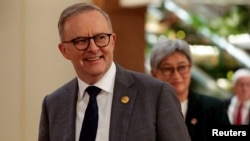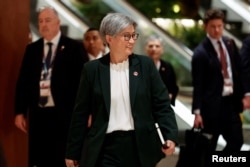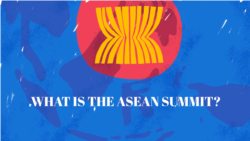Australian Prime Minister Anthony Albanese is making a new business pitch Wednesday to Southeast Asian leaders at the ASEAN summit in Jakarta. Southeast Asia is Australia's second-largest trading partner behind China, but the Canberra government is hoping to deepen economic ties with its neighbors to reduce its trade reliance on Beijing.
Trade is the lifeblood of the Australian economy. It contributes more than 40% of the nation’s income, or GDP.
Twelve of Australia’s top 15 export markets are in Asia. China is, by far, the most dominant, receiving about a third of Australia’s exports of goods and services.
The Association of Southeast Asian Nations, or ASEAN, is also a significant trading bloc, accounting for 12% of Australia’s total exports.
In 2021, Australia's trade with ASEAN countries was $80.8 billion, which is greater than its two-way trade with Japan and the United States, according to official government data.
Coal and natural gas are key Australian exports to the ASEAN grouping, along with agricultural goods and education services. ASEAN members sell petroleum products, vehicles and transport services to Australia.
The ASEAN region includes some of the fastest growing countries in the world, with increasingly urbanized, digitized and educated populations. But a report commissioned by the government in Canberra says that trading ties with ASEAN members have become stagnant and need a boost by increasing the number of flights to the region as well as reducing barriers to foreign investment.
Australia’s annual economic ties with Indonesia are worth about $4.64 billion, or less than 2% of Australia’s total global trade.
Prime Minister Anthony Albanese told parliament in Canberra Tuesday that it was one area where he hopes to boost commercial ties.
“We have Indonesia, one of the world’s largest economies and one of the world’s largest democracies, just on our doorstep," Albanese said. "But the truth is it is not even in our top trading partners.”
Australia’s trade with China has been disrupted in recent years because of various geopolitical disputes, including democracy in Hong Kong, freedom of navigation in the South China Sea, COVID-19 and human rights, prompting Australia to seek new markets and diversify its trade.
Leigh Howard is the head of Asialink Business at the University of Melbourne. He tells VOA that ASEAN members represent sound opportunities for Australia.
“Diversification continues to be a theme as businesses look for new markets either in addition to or instead of China," Howard said. "Once again, with the proximity of Southeast Asia, the rising affluent class in large, populous countries this makes for a compelling opportunity for Australian businesses.”
The ten-nation ASEAN bloc was formed in 1967. It includes Indonesia, Malaysia, the Philippines, Singapore, Thailand, Brunei, Vietnam, Laos, Myanmar and Cambodia.
This year's ASEAN summit in Jakarta will be notable for the absence of Chinese President Xi Jinping and his US counterpart, Joe Biden.







